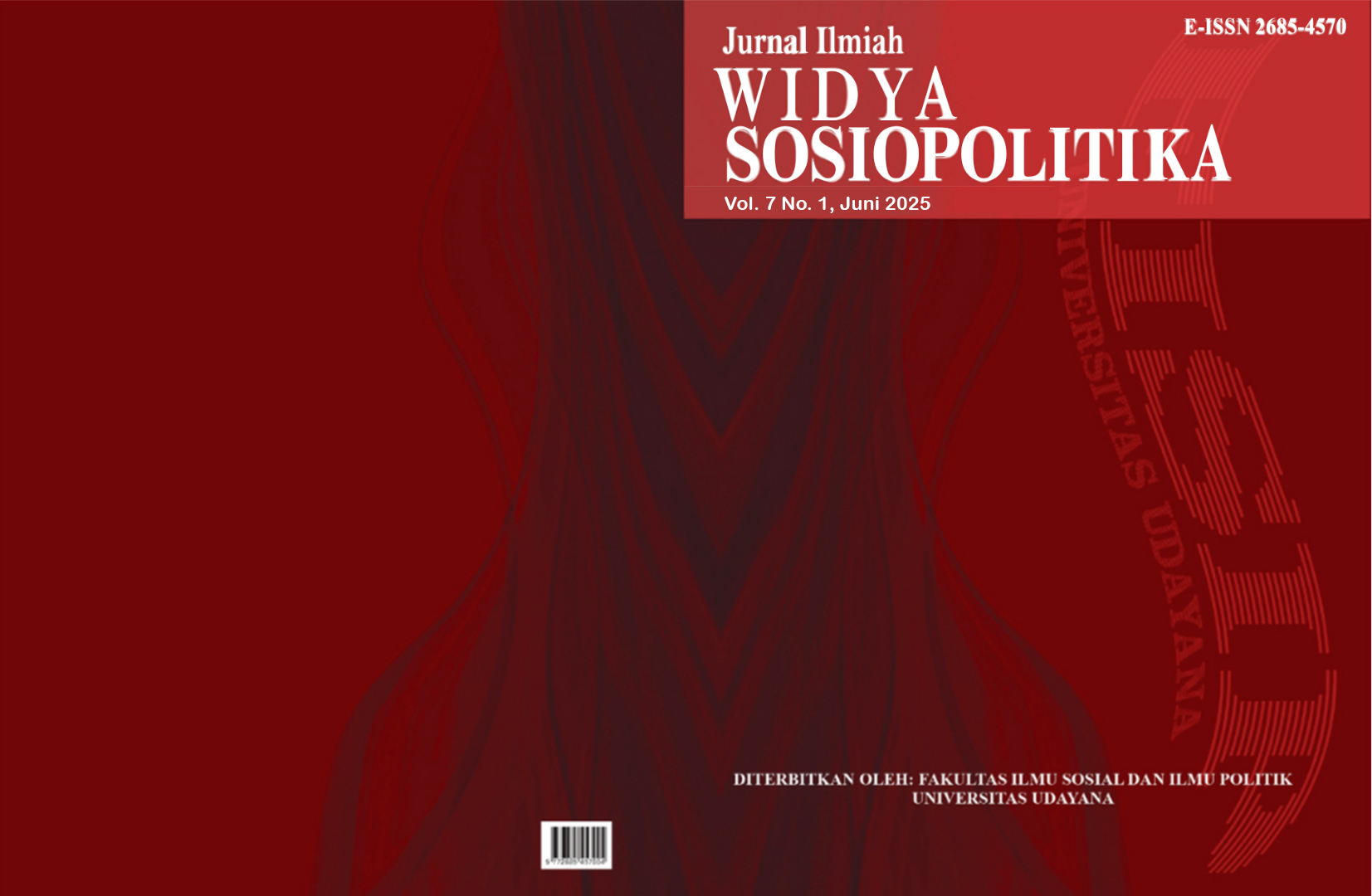Representasi Digital dan Akses Pengetahuan: Pengalaman Pengguna Tentang Sistem Informasi dalam Layanan Sosial
Abstract
The high poverty rate in East Java illustrates not only economic inequality but also challenges in accessing inclusive and transparent social services. This study aims to examine how digital social service information systems represent knowledge and enable access from the perspective of everyday users. Using a qualitative exploratory case study approach, the research involved 15 informants such as students, housewives, and general citizens from three regions in East Java: Surabaya, Malang, and Trenggalek. Data were collected through in-depth interviews, direct observation, and document analysis, and were analyzed thematically based on user experience. The findings reveal four key factors influencing users’ interactions with the system: accessibility, clarity of information, system responsiveness, and perceived benefits. Despite the availability of platforms such as SIKS-NG and cekbansos.kemensos.go.id, users encountered barriers such as unclear terminology, technical delays, and limited digital literacy, especially among vulnerable groups. These barriers often undermined the systems’ potential to promote inclusive access to public knowledge. The study concludes that user satisfaction and perceived usefulness are strongly determined by system quality and clarity of content. Therefore, the success of digital transformation in social services depends on the extent to which such systems are user-centered, inclusive, and context-sensitive.
Downloads
References
Akbar, M. F. (2023). Implementation of Social Welfare (DTKS) Integrated Data Program through the Next Generation Social Welfare Information System (SIKS NG). International Journal Papier Public Review.
Andriani, Y., Suwitri, S., & Yuniningsih, T. (2023). Penerapan E-Government Melalui Sistem Informasi Kesejahteraan Sosial Next Generation (SIKS-NG) Sebagai Aplikasi Pengolah Data Kemiskinan Di Kabupaten Bengkulu Selatan. Jurnal Agregasi.
Asrandi, A. M. (2022). Efektivitas Program Sistem Informasi Kesejahteraan Sosial (SIKS-Ng) dalam Mendukung Program SLRT dan Puskesos Dinas Sosial Provinsi Sulawesi Selatan. Jurnal Indonesia Sosial Sains, 1294-1305.
Chaimaa, I., & Khalid, C. (2023). The Public Value of e-Government from the Perspective of Private-Sector Professionals in Morocco. ESI Preprints.
Choirunnisa, L. (2023). Peran Sistem Pemerintah Berbasis Elektronik (SPBE) Dalam Meningkatkan Aksesibilitas Pelayanan Publik di Indonesia. Sosio Yustisia: Jurnal Hukum Dan Perubahan Sosial, 71-95.
Davis. (1989). Perceived Usefulness, Perceived Ease of Use, and User Acceptance of Information Technology. MIS Quarterly, 319-339.
DeLone, W., & McLean, E. (2003). The DeLone and McLean model of information systems success: A ten-year update. Journal of Management Information Systems, 9-30.
Firmansyah, A. D., & Susanto, T. D. (2023). The unsuccessful of Satu Data Indonesia (SDI) implementation: a lesson learned from local government. Jurnal Mantik, 311-320.
Fuaddah, A. (2023). Literasi Digital Masyarakat sebagai Respon Persoalan Bantuan Sosial Yang Tidak Tepat Sasaran (Studi Kasus di Kelurahan Nanggewer, Cibinong, Bogor, Jawa Barat). Jurnal Paradigma: Jurnal Multidisipliner Mahasiswa Pascasarjana Indonesia, 74-82.
Malik, M. H., & Utomo, Y. P. (2024). ANALISIS DETERMINAN KEMISKINAN DI WILAYAH PROVINSI JAWA TIMUR TAHUN 2018-2022. Jurnal Menara Ekonomi.
Maulidya, R., & Rozikin, M. (2022). ANALISIS RETROSPEKTIF KEBIJAKAN SATU DATA INDONESIA. Dinamika : Jurnal Ilmiah Ilmu Administrasi Negara.
Mellouli, M., Bouaziz, F., & Bentahar, O. (2020). E-government success assessment from a public value perspective. International Review of Public Administration, Taylor & Francis Journals, 153-174.
Miles, M. B., Huberman, M., & Saldana, J. (2014). Qualitative Data Analysis. SAGE.
Mukub, M. A.-K., Handayani, P. W., & Sunarso, F. P. (2025). Citizen acceptance and use of the Jakarta Kini (JAKI) e-government: Extended unified model for electronic government adoption. Heliyon.
Mursyidah , L., & Nofi, N. (2024). Evaluating SIKS-NG's Performance in Jabon District Social Welfare. Indonesian Journal of Cultural and Community Development, 6-16.
Partnership, O. G. (2020). Presidential Regulation No. 39 of 2019 on One Data Indonesia. Diambil kembali dari Open Government Partnership: https://www.opengovpartnership.org/members/indonesia/commitments/ID0113
Putra, D. S., Selo, S., & Fauziati, S. (2022). EVALUASI DOMAIN MANAJEMEN SPBE PEMERINTAH KOTA YOGYAKARTA BERDASARKAN PERATURAN MENTERI PAN-RB NOMOR 59 TAHUN 2020. Jurnal Informatika dan Komputer, 54-61.
Ramadan, E. (2024). PENERAPAN E-GOVERNMENT MELALUI SISTEM INFORMASI KESEJAHTERAAN SOSIAL NEXT GENERATION (SIKS-NG) UNTUK PENGAJUAN DTKS. Jurnal Sosial dan Teknologi, 109-115.
Sarjito, A. (2025). Evaluation of the Efficiency of the Social Welfare Information System-Next Generation (SIKS-NG) in the Distribution of Social Assistance. JGPA (Journal of Governance and Public Affairs).
Thompson. (1991). MIS Quarterly. Personal Computing: Toward a Conceptual Model of Utilization, 125-143.
Windari, V. D., & Rodiyah, I. (2024). Mengubah Sistem Kesejahteraan Sosial: Wawasan dari Sistem Informasi Generasi Selanjutnya (SIKS-NG). Frontiers in Research Journal.
Yuhefizar. (2025). Digital Transformation in Rural Governance: TAM Analysis of E-Government Adoption in Indonesia. International Research Journal of Multidisciplinary Scope (IRJMS), 183-195.




1.png)

3.png)








 Diterbitkan oleh Fakultas Ilmu Sosial dan Ilmu Politik Universitas Udayana
Diterbitkan oleh Fakultas Ilmu Sosial dan Ilmu Politik Universitas Udayana
